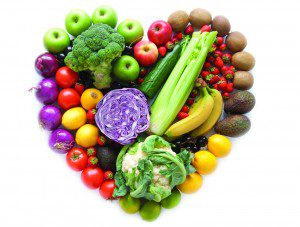By Randall Kenneth Jones
Though my recent heart attack scare was just that: a “scare”—it was frightening enough to make me think.
First, why do we need to have a “scare” to make us sit up and take note?
And second, considering my advancing age, I should be a bit kinder to my heart. After all, it has been very good to me—so far.
Yes, there’s the obvious benefit of cardio workouts and regular exercise, but my personal disaster area is my diet. Nothing against Ronald, Mayor McCheese, the Hamburgler and the rest of the gang, but based on the number of people in line next to me at McDonalds, I’m certainly not alone in the need for a dietary tune up.
I have also discovered that there are many who believe they “eat right;” however, a trip to a registered dietician often reveals otherwise.
My next step was to bite the bullet—as opposed to the Double Quarter Pounder with Cheese—and seek professional help. For me, this much-needed assistance came in the form of dietician Julie Carley, LDN, from Physicians Regional Healthcare System.
Julie Carley received her B.S. in Food Science from the University of Florida. She is also expected to receive her Master’s Degree from Capella University in June of this year.
As I was that annoying child who always asked tons of questions, especially from my childhood doctors, “adult me” came to Julie absolutely hungry for information.
I also took copious notes on our discussion. With all the technology available these days, it’s a wonder more patients don’t take notes, record or even videotape their critical doctor/patient exchanges.
Meaning: do it—it will help you so much when you get home and begin to apply what you have just learned!
What made you originally decide on becoming a dietician?
“Growing up, I worked alongside my father and grandfather—both pharmacists in their local pharmacy. My father expanded the business and became a main supplier for long-term care facilities across New Jersey.
I would visit the facilities with my father and was always impressed by the dietitians. I admired their clinical expertise and unique position in the medical field. There is a critical and necessary element of nutrition in healing which I always found intriguing.”
What types of patients do you typically see?
“I see various patients with a wide range of medical and non-medical issues. More typically, I receive referrals from physicians for those with diabetes, pre-diabetes, cardiovascular issues, gastrointestinal dysfunctions, and renal disease. In addition, my current Master’s Degree internship has allowed me to also treat patients who are experiencing eating-related disorders and emotional eating.”
How do you view your role within the healthcare community?
“I provide patients with realistic and functional food plans that are specific for efficacious treatment, yet broad enough to avoid placing stress on the patient. It is rewarding to see a patient leave with renewed motivation and a big smile and say, ‘I can do this’!
“I don’t see patients as patients; I view them as individuals—and finding the right treatment plan does not include just food…it’s so much more.”
What tips do you have for those of us seeking a heart-healthy diet?
“There is an endless amount of conflicting information out there, and I find that most people are not quite sure what ‘heart healthy’ foods are anymore. I recommend following a Mediterranean Style diet plan—a well-studied diet plan that supports heart health and prevention of other disease processes.
“I generally utilize the Mediterranean framework as a base plan and then modify and individualize plans based on the diagnosis and the patient’s goals.
“Meals should always be well balanced with lean protein sources, whole grains/fruit, and lots and lots of veggies! I recommend staying away from processed foods as much as possible and you must ALWAYS know what you are eating by reading the Nutrition Facts labels versus believing the front of the package.
“Check information you hear/see on TV through a reputable professional association such as the American Diabetes Association or American Heart Association—or ask your dietitian or doctor.”
What “rewards” do you receive from “a job well done”?
“The reward is seeing the person succeed in living their life and feeling better—not only physically, but mentally. Nutrition is the epicenter of health and once a person begins to eat more healthfully, medical complexities improve.”
Julie Carley, LDN, sees patients at the Collier
Boulevard and Pine Ridge campuses of Physicians Regional Healthcare Systems. For more information or to schedule an appointment, please call 239-348-4538
For Valentine’s Day: Julie Carley on Chocolate
One of the most popular gifts for Valentine’s
Day is chocolate. While being a delicious treat,
it is important to not overindulge—hence the word “treat”.
 In its most raw form, cocoa, the primary ingredient in chocolate, has been known to carry health benefits. Most of the research has been focused on cardiovascular protection and cocoa’s ability to alter some of the pathological metabolic processes contributing to development of cardiovascular related illnesses.
In its most raw form, cocoa, the primary ingredient in chocolate, has been known to carry health benefits. Most of the research has been focused on cardiovascular protection and cocoa’s ability to alter some of the pathological metabolic processes contributing to development of cardiovascular related illnesses.
In addition, cocoa is rich in several vitamins and minerals such as iron, zinc, magnesium, potassium, and manganese.
Specific to dark chocolate, benefits are found in two specific flavonoids: epicatechin and catechin as well as in the component theobromine. These are natural plant-based antioxidants that help our body’s defenses against free radicals.
When purchasing or consuming chocolate products, consider the amount of cocoa in that product. The ingredients list should feature cocoa toward the top. The best choices will indicate at least 70% or more cocoa concentration.
So yes, please enjoy Valentine’s Day and feel free to give your sweetheart a chocolaty treat that is truly good for the heart!









